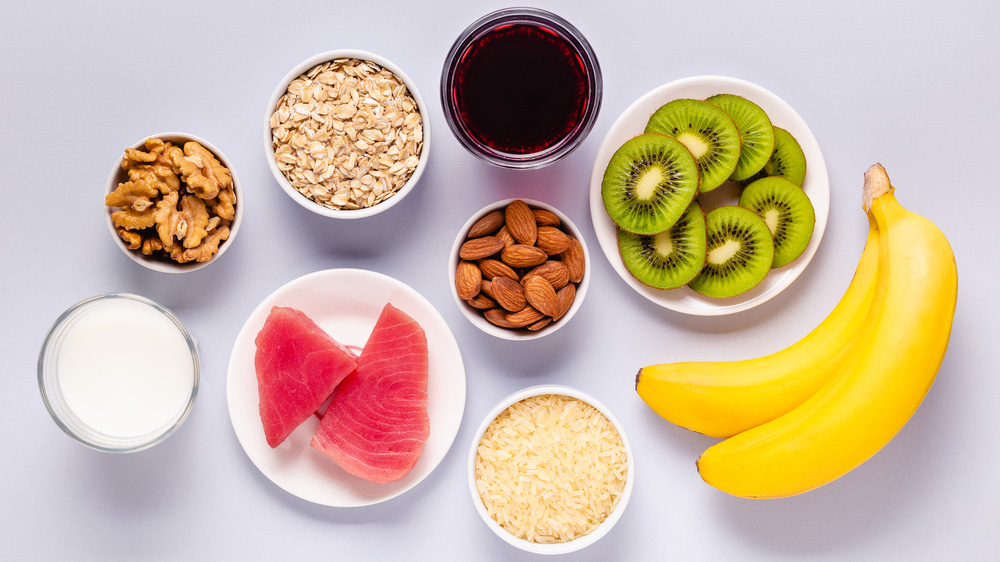Sleep… That sweet, restorative embrace we sometimes search for in vain, like a secret love in the night. But did you know that what you eat and the natural supplements you choose can play a key role in the quality of your nights? If insomnia or restless nights have become too frequent, it’s time to refresh your routine with natural, tasty solutions. Nutrition and supplements can be powerful allies in offering you the restorative sleep you’ve been longing for. Welcome to a journey where each bite and each supplement invite you into deep, revitalizing rest.
Nutrition: A Key to Prepare the Body for Sleep
First and foremost, think about your food. What you put on your plate should not only nourish your body in general, but also prepare your system for a good night’s rest. Some foods contain natural compounds that stimulate the production of melatonin, the sleep hormone, or calm the nervous system to gently guide us into dreamland.
1- The Power of Melatonin
Melatonin is well known for its central role in sleep regulation. This natural hormone, produced by our pineal gland, helps us fall asleep in sync with our circadian rhythm. Some foods, like cherries, bananas, and nuts, are particularly rich in melatonin and can naturally stimulate its production. Tart cherries, in particular, are one of the rare food sources of this hormone, providing a small boost to your biological clock.
Magnesium: A Relaxing Ally
Magnesium is an essential mineral, often overlooked, but vital for our overall well-being, especially for quality sleep. It acts as a natural relaxant by regulating the production of GABA (an inhibitory neurotransmitter), which calms neuronal excitation. You’ll find it in foods like spinach, pumpkin seeds, almonds, and even dark chocolate. A small piece of chocolate before bed could not only satisfy your taste buds but also prepare your body for restful sleep.
Proteins and Amino Acids
Proteins, especially an amino acid called tryptophan, are significant allies in promoting sleep. Tryptophan is a precursor to serotonin, which in turn is converted into melatonin. You can find tryptophan in protein-rich foods like turkey, milk, eggs, and nuts. A small snack of warm milk or a handful of nuts before bed could be a gentle preparation for a peaceful night.
Carbohydrates: Allies in Moderation
Too many carbohydrates, especially refined sugars, can disrupt your sleep by increasing insulin levels and causing blood sugar instability. However, complex carbohydrates found in whole grains (such as oats, quinoa, and brown rice) can be beneficial in promoting restorative sleep, as they contribute to serotonin production, the neurotransmitter of well-being. Eating a small portion of oats before bed can help with relaxation.
Hydration Matters
Hydration is essential, but be cautious of overdoing it. Too much liquid just before bed can disrupt your sleep with nighttime trips to the bathroom. On the other hand, drinking water throughout the day, especially soothing herbal teas like chamomile or lavender, can promote good hydration and contribute to quality sleep.
Natural Supplements: Targeted Allies for Sleep
In addition to a balanced diet, certain natural supplements can provide an extra boost to enhance your sleep. These supplements, derived from plants, natural extracts, or substances, work in harmony with your body to promote relaxation and ease the process of falling asleep.
Melatonin Supplements
As mentioned earlier, melatonin is a key hormone in sleep regulation. As a supplement, it can be used occasionally to restore a disrupted sleep cycle. Take it about 30 to 60 minutes before bed to promote sleep onset. However, it’s important not to overuse it, especially in cases of chronic sleep disturbances.
Valerian: The Plant of Relaxation
Valerian is a well-known plant for its calming and sedative properties. It has been used for centuries to treat insomnia and anxiety. In supplement form, valerian can reduce the time it takes to fall asleep and improve sleep quality by decreasing nighttime awakenings. An extract of valerian in a capsule or a tea before bed can be a great way to unwind before sleep.
Passionflower: A Gentle and Effective Remedy
Passionflower is another plant renowned for its relaxing properties. It works on the nervous system, promoting a calming effect without inducing excessive drowsiness in the morning. Passionflower is ideal for calming mental agitation before sleep and promoting deep sleep.
Magnesium: An Anti-Stress Remedy
As discussed in the food section, magnesium is a mineral with many benefits, one of the most well-known being its ability to support muscle relaxation and mental calmness. In supplement form, it can be taken in various forms (citrate, glycinate) for optimal sleep quality, especially for those suffering from nocturnal cramps or muscle tension.
Ashwagandha: An Adaptogen for Relaxation
Ashwagandha, an adaptogenic herb, is used in Ayurvedic medicine to regulate stress and improve sleep. It helps reduce cortisol levels, the stress hormone, and promotes deeper sleep. As a supplement, ashwagandha can be a powerful ally for nights disturbed by anxiety.
Conclusion
As you can see, nutrition and natural supplements can play a significant role in improving the quality of your sleep. A small adjustment in your diet, combined with the right supplements, could transform your nights into a peaceful, restorative haven. Let these natural allies guide you toward sweeter dreams and well-deserved rest. Ready your forks, your teacups, and your carefully chosen supplements for more serene, deeply restorative nights!
Sources :
- Efficacy of dietary supplements on improving sleep quality PubMed
- Current Evidence on Common Dietary Supplements for Sleep Quality. PubMed
- Supplementing your sleep. Harvard Santé
- Natural Sleep Aids: Which Are the Most Effective? Verywell Health
- Nutrition and Sleep: Diet’s Effect on Sleep Fondation du sommeil


